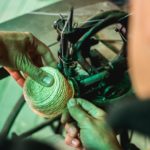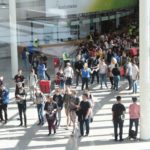The REFLOW Pilot Approach
Testing diverse approaches to city circularity
The REFLOW Pilot Approach
Six pilot cities across Europe will test diverse approaches to city circularity through focussing on different resource flows by engaging a productive ‘making’ approach that empowers citizens, engages policymakers and industry leaders.
The Pilot Cities Tackle Circular Economy Strategies
REFLOW is a people-centered project, at its core sits the development, testing and iteration of Circular Economy (CE) strategies in six Pilot cities across Europe. In each Pilot city, a local interdisciplinary team with actors from public institutions, civil society and SMEs, and entrepreneurs, including entrepreneurs, maker spaces and fab labs, focus on one specific resource stream across five different challenges.
1. Business and society,
2. Technological development,
3. Material flow analysis,
4. Governance, network and policy,
5. Citizen Engagement and Capacity Building.
Each of the Pilots focuses on their own local topic, dynamics, cultures as well as social, economic, and technical challenges. They are recipients and test-sites for the application of the wider project knowledge, tools, and learnings. Pilot leaders will co-create, test and implement circular practices within their local context, fostering the transition towards regenerative and circular cities, as well as providing useful examples for other cities to engage in this necessary transition.
Each Pilot City Focuses on a Different Material Flow
Amsterdam: Textile (Life)cycling
Amsterdam is locally tackling 1 of the world’s most polluting industries: textiles. Each year, the city alone disposes of 14,000 tons of textiles. The Amsterdam Pilot focuses on textiles used by consumers and companies; the ways textiles are discarded and reused; and how textile waste can be brought back into the material flow. It will especially focus on the increase of home textiles that are recycled to be made circular, by supporting diverse collection methods with citizens, while providing feedstock for the recycling industries and creating supply for different markets, creating new business opportunities.
Pilot members: Waag Society?, BMA Techne, Pakhuis de Zwijger?, Gemeente Amsterdam, Metabolic.
Berlin: Waste-heat
The Berlin Pilot is focussed on ‘waste heat’. Waste heat is a renewable energy source which is not utilised to its full potential and is almost invisible for citizens. The Berlin Pilot will use water to re-channel waste heat from the built environment into the urban metabolic system, and couple it efficiently with complementary water sources to reuse in different contexts. To this end, properties that are easily accessible to civil society, such as makerspaces, coworking places or urban farming facilities, are to be equipped to use waste heat in a particularly tangible way. The Pilot partners want citizens to understand the potential of this energy source in existing and new urban developments, thus getting better use of waste heat to become the standard, not the exception.
Pilot members: Berliner Wasserbetriebe (BWB)?, Agile Heap e.V., Fraunhofer FOKUS?, MCS Data Labs?.
Cluj-Napoca: PlEnergy
Cluj-Napoca Pilot is looking at energy consumption. The pilot aims to prove how the measures taken to date by the City have impacted the energy efficiency of selected buildings and to involve key stakeholders in implementing and furthering the measures already taken. The Pilot team will work to disseminate the information gathered at household and business level to encourage different actors in the ecosystem to propose new ideas regarding renewable energy sources which can be integrated in the City’s strategy for a circular economy. This will be complemented by educating citizens on the circular economy, its benefits and possibilities.
Pilot members: Municipality of Cluj-Napoca, Aries Transilvania, National Institute for Research and Development of Isotopic and Molecular Technologies (ITIM).
Milan: Food Market 4.0
Milan will deliver a Pilot focused on “Circular Markets”. At the centre will be Milan’s Municipal Covered Markets, some of which were founded in the 1950s, which now suffer from high vacancy rates, decaying facilities and declining community interest within neighborhoods with viable commercial alternatives. The Municipality is looking to develop a strategy for Markets based on sustainable food logistics, market laboratories to spread circular practices and tracking interrelations between rural and urban communities. The goals of Food Market 4.0 are to anchor local culture, food traditions and healthy eating; to promote social integration to complement public sector initiatives; to build capacity among local stakeholders and community partners; and to create economic impact for vendors and local businesses.
Pilot members: Comune di Milano, We Make, OpenDot, POLIMI (Politecnico di Milano).
Paris: Fair Tracker
Paris is the leading city for conventions and exhibitions. Over 400 shows with more than 10 million visitors every year make use of many temporary structures and produce large amounts of waste, including wood and packaging which are used only for a short period of time. In this ecosystem of different agents (designers, event planners, site managers, waste management companies) there is a lack of specific agents taking care of and coordinating the flow and life cycle of materials involved. The Paris Pilot focuses on creating specific conditions for these agents in order to coordinate the use and reuse of materials involved in the event and temporary structure sectors. To achieve that, the Paris Pilot uses fab labs and maker spaces as the core infrastructure to develop four different actions: a tracking label, a set of tools for scanning resources, a waste management protocol and an incubation program.
Pilot members: Fab City Grand Paris, Marie de Paris, Volumes, Ars Longa.
Vejle: Circular Plastics
The Vejle Pilot focuses on Plastic. Vejle Municipality, along with other local stakeholders from the civil society, the public and the private sectors will co-design new sustainable solutions to reduce the need for plastic. With different micro test-sites, including public facilities and residential areas, the whole project builds upon a design thinking method, which connects to Fab Labs and prototyping workshops. The social and civic responsibility of gathering waste and motivating its reuse is also a focus in the municipality. The Pilot aims to provide realistic best practices through a people-centered approach, fostering changes in local and national policy.
Pilot members: Vejle Kommune, Danish Design Centre.
Coordinating the Pilot Approach
The coordination and governance approach to the Pilot Cities, together with their action plans can be seen in the document: Detailed Pilot Planning and Evaluation Framework– a deliverable developed by Waag Society within the REFLOW Project. The document also describes the conceptual and theoretical foundations as well as the values and procedures that underpin the Pilot coordination approach.
We are pleased to release more detailed information about the journeys of the Pilot Cities and their stakeholders in the coming months.
ABOUT THE AUTHOR
Kate Armstrong
Communications Lead for Fab Lab Barcelona





